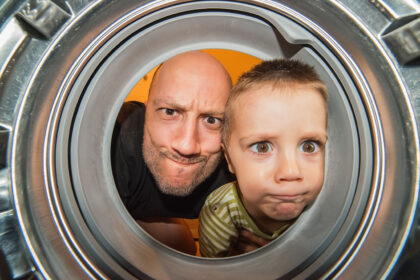Our washing machine has a problem finding its center. When it enters a spin cycle—which is intended to be a regular part of its functioning—it becomes unbalanced. The clothes are unevenly distributed in the machine, and it can’t function properly. It makes an awful racket.
Sometimes, this imbalance completely shuts down the machine. Sometimes, it starts a rinse cycle all over again, hoping that if it goes back to a working point in the process, it can more effectively distribute the clothes around its center of balance. Occasionally, this works.
Most of the time, we are faced with a frustrating decision. Hang up clothes to dry while they’re still sopping wet. (Possibly put clothes in the dryer for much longer than we want.) Or try to rearrange the clothes in the washing machine so that they are evenly distributed around the machine’s center of balance.
This last option requires careful timing on our part. We have to be attentive to when the machine is becoming unbalanced, and we have to act swiftly before it decides to start a rinse cycle all over again. Then, we wait by the machine with bated breath to find out whether our efforts are successful. This process often needs to be repeated several times before our washing machine is centered enough to complete a load of laundry.
As one might imagine, this machine causes a degree of stress and frustration that spills over into other areas of our home life. One appliance being unable to find its center is not an isolated inconvenience. It is part of an interconnected web of household fixtures.
Much like people. When we are unable or unwilling to find our center, we might feel a sense of imbalance within ourselves. Our internal functioning might be less than optimal. We also affect the people around us.
Other people may work around our under-functioning and express their frustration in a variety of visible and invisible ways. Or they may set aside their own priorities and try to manage us—to help us rearrange the contents of our lives in such a way that balanced functioning becomes more possible.
We might even find ourselves doing that sort of thing for other people—trying to help others find a sense of center to the extent that we forget our own. In some groups, the least centered people become the center of attention for everyone else.
Our washing machine can’t intentionally decide to find its center. So, we’re replacing it. I suppose in extreme cases, some people take this approach with others as well.
Whatever the response, our unwillingness to tend to our center has an effect on the world around us. The good news is that finding our center also has an effect. Not only do we have a greater sense of balance and greater confidence about what we want to guide our decisions and behavior, we also positively influence others toward their own center of balance. Finding our center nurtures greater well-being within and around us.
When has someone else’s commitment to finding their center had a positive influence on your attitude or functioning? And how do you think your willingness to find center might affect the people around you?
Share this post:
